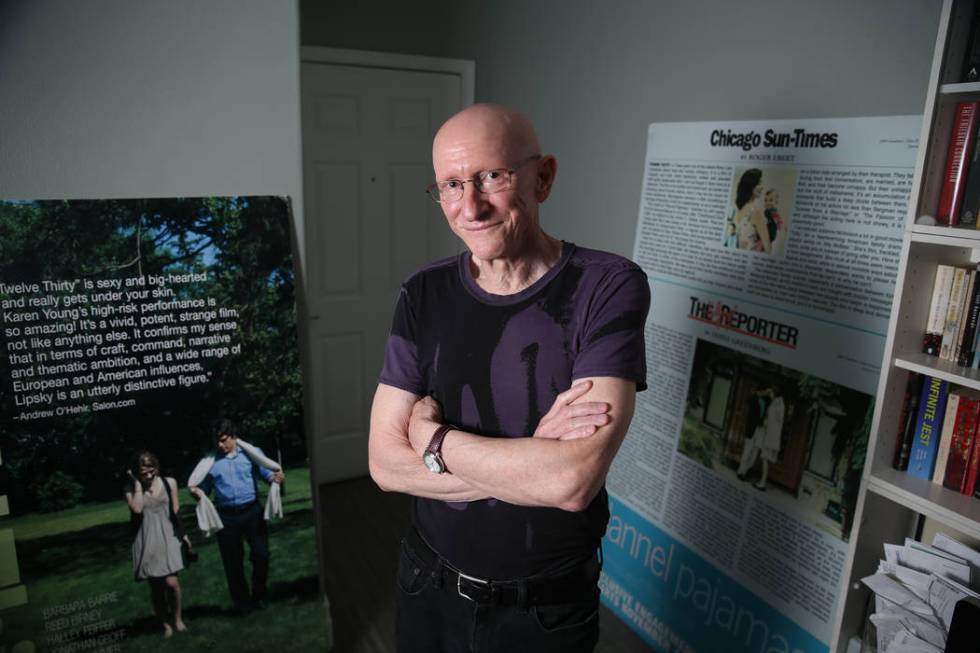Las Vegan has worked with some of the biggest names in cinema

Vegas Voices is a weekly series highlighting notable Las Vegans.
Jeff Lipsky’s resume reads like a catalog of movies you always meant to watch.
During his four-decade career in film distribution, the newly minted Las Vegan worked with the likes of Federico Fellini, Jean-Luc Godard, Jim Jarmusch, Werner Herzog and Wim Wenders.
He distributed “Sid and Nancy,” “My Life as a Dog” and “My Dinner With Andre,” the latter of which, he confides, he never really liked.
“My original inspiration,” Lipsky says, “my mentor, my hero, my teacher, my guide, my guru, my sherpa, was John Cassavetes. … He hated Hollywood, so he decided he was going to basically invent independent American film.”
In 1971, as a film critic at Nassau Community College, Lipsky talked himself into an interview with the actor-turned-director. Three years later, when Cassavetes’ “A Woman Under the Influence” was playing the New York Film Festival, Lipsky was managing a movie theater. They reconnected and, two weeks later, Lipsky was one of six acolytes offered a job distributing the movie.
“We didn’t know what distribution was,” Lipsky, 66, recalls. “But I thought by sidling up near him, each and every day, it would accelerate the process by which I could make my own movies. I didn’t realize it would take another 21 years.”
“Childhood’s End,” the first movie Lipsky wrote and directed, was released in 1996. His seventh, “The Last,” is scheduled to open Friday at Village Square.
“I think, as much as anything else, this movie is a love story,” says Lipsky, who, when he really gets going, evokes a less-venomous Larry David. “It’s a love story about a contemporary Jewish family — two married couples, one conservative Jewish, one modern Orthodox Jewish — whose lives are turned inside out in the course of 24 hours. And, as the result of what they learn, they are brought more closely together, both their love for each other and for their faith, than ever before.”
“The Last” features a star turn by 90-year-old Rebecca Schull that he can’t stop raving about. “No actor will deliver a performance that eclipses her performance in my movie,” he declares.
After moving to Las Vegas from his native New York in October, Lipsky plans to shoot his eighth film here, hopefully beginning in March.
“My living has always been as a film distributor,” he says. “I’ve done very well as a film distributor, and that’s enabled me to exercise this artistic side of me, which has been the most exhilarating, most satisfying, most soul-quenching thing I’ve ever done in my life.”
Review-Journal: You’ve been a critic, usher, theater manager, distributor, writer and director. Is there any aspect of movies that you haven’t been involved in?
Jeff Lipsky: I would love to own a movie theater. … It’s something I wanted to do when I lived in New York. It’s something I’d love to do here.
At what point did you know you wanted a career in movies?
When I was 10 years old, I walked down to my local movie theater on Long Island and asked if I could be an usher. They told me I was too young; you had to be 16. So I wrote a letter to President Kennedy complaining. We got a letter back from the White House referring me to the New York State Department of Labor. Six years later on my birthday, I went to that theater again and applied for a job. And that was my first paid job in the industry. But I wrote my first script when I was 12 or 13 years old. It was a two-part episode for “The Man From U.N.C.L.E.”
What was it about Cassavetes that appealed to you?
He had laserlike vision where he absorbed everything in his field of vision and managed somehow, in a smart, intelligent way, to incorporate it into a movie about fictional people and make it seem right and real.
You’ve distributed some major indie works over the years. What do you attribute that to? Is it your taste? Luck?
I’ve been very fortunate. I think it’s a little bit of everything. I think it is my taste. I think it is luck. I think it’s my abject dedication to any film that I’m fortunate enough to represent, regardless of how big it opens or how modestly it opens.
You were wanting to make your own movies the whole time. What took so long?
I’m glad it took so long. I wrote a movie in 1978-79 that I thought was ready to go, that this was going to be the movie. And it’s not bad, but it wasn’t going to be a great movie. I think that’s what distribution did for me. It enabled me to live really well, but also that was my education. … Seeing all those movies. Representing all those movies and representing those filmmakers. Being on Mike Leigh’s sets. Being on John Cassavetes’ sets. It taught me so much.
“The Last” is your seventh film. What was it about this particular story that you wanted to tell?
Given the amount of virulent anti-Semitism that’s going on in the world and especially in this country today, I thought, “This is right.”
Is there still a place for independent cinema in the theatrical marketplace?
I think it’s still there. I think it’s a potent audience, but I think it’s an audience that’s over 50 years old. I think the audience that’s under 50 years old has been undereducated. When I see young audiences at these films, they gobble them up, but they don’t know they’re out there. They don’t go. … Nothing will replace the societal experience of going to a movie theater … and experiencing a comedy or a tearjerker or a horror movie or a drama or a foreign film with subtitles.
Contact Christopher Lawrence at clawrence@reviewjournal.com. Follow @life_onthecouch on Twitter.